#HackingDemocracy
#HackingDemocracy - Lessons from around the world on fostering Democracy
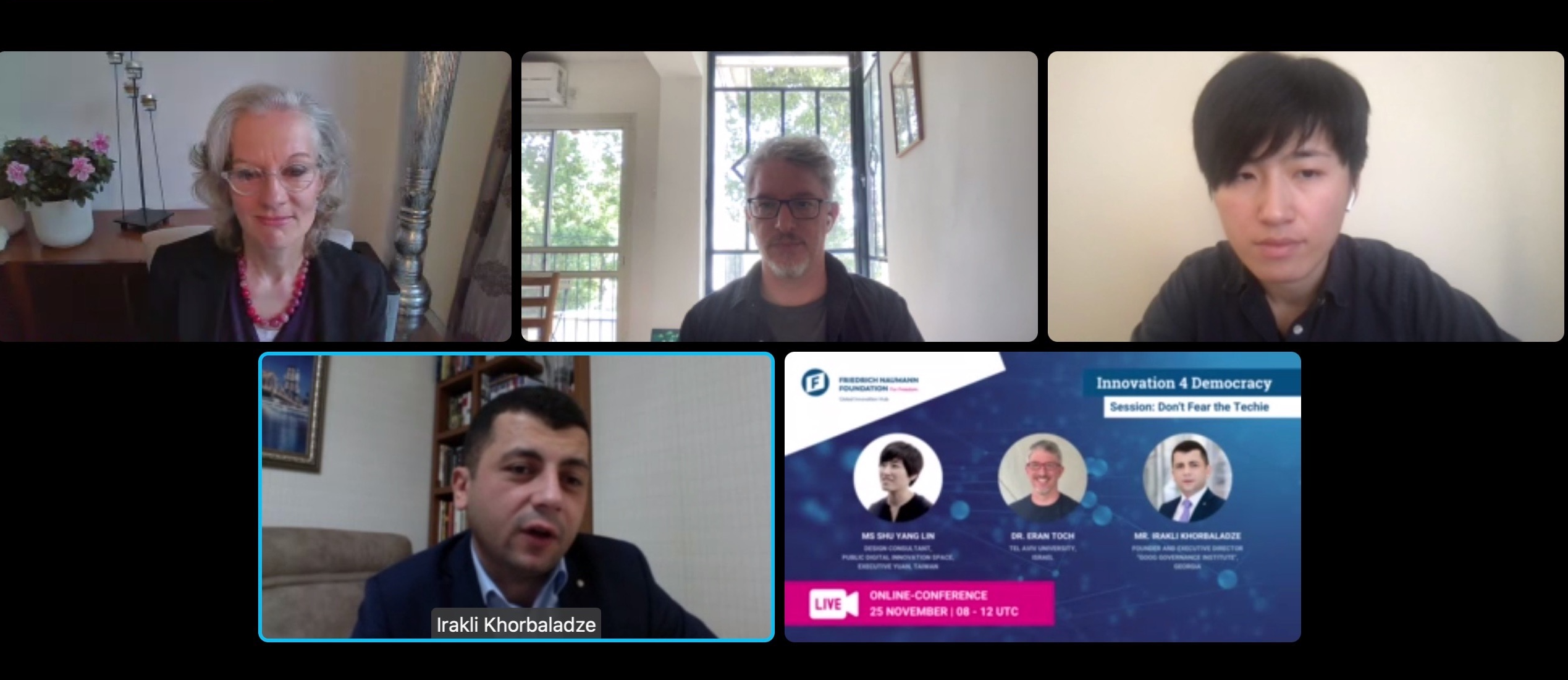
On 24-25 November 2021, the FNF Global Innovation Hub held the Innovation for Democracy conference, kick-starting the Hub’s project work after it moved to Taiwan in 2021. In this two-day conference, we wanted to highlight different aspects and approaches on how to foster and protect democracy. Our board member at the time, Ms Bettina Stark-watzinger who is now the German Federal Minister for Education and Research, inaugurated the conference with a greeting message. Panelists from across the world shared their experience on how to use deliberative democracy to inspire innovation and participation from citizens, what positive lessons from the outbreak of COVID-19 there can be found, how to use technology to foster democracy, and how to fight against disinformation.
The conference was divided into four sessions: deliberative democracy, pandemic learnings, don’t fear the techie, and disinformation. Each session consisted of short inputs by panelists, and was followed by a discussion that included questions from the audience. All sessions have been recorded and can be watched online. Links are provided in each session description and our facebook page.
Deliberative Democracy Session
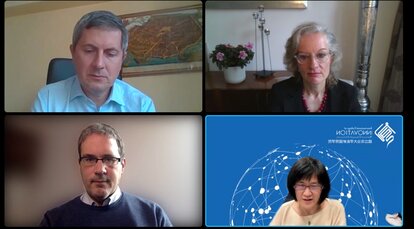
In Deliberative Democracy Session, our panelists, Dean of the International College of Innovation Prof. Wen-ling Tu, Former Parliament Member Dr. Christopher Gohl, and Member of Parliament Dan Barna, shared with us that deliberative democracy is a way to extend more spaces and cultivate more innovations in public participation.
Panelists have share important ideas as follows:
Dr. Gohl highlighted that deliberative democracy initiates an important learning process that gathers people and government together to learn how to use democratic ways to solve problems together, making democracy a “learning democracy.” Different roles in the discussion, including people working in governments and scientists, need to learn how to make use of existing innovative ways to facilitate participation. Enhancing people’s participation is the key to make government decision making more transparent, and we need platforms such as citizen council to bridge our citizens to policy making process.
Secondly, deliberative democracy can not only be applied to local issues, but also to national issues. Its features of establishing an inclusive, innovative, and open culture of public discussions also make it an important approach for a wide range of policies and social issues. For example, Prof. Tu mentioned that in Taiwan, deliberative democracy has be adopted by the government and civil society in policies regarding national energy transition and nuclear waste disposal.
Deliberative democracy can also facilitate democracy inside political parties. By sharing his experience, Mr. Bana demonstrated that it was possible to use digital tool to facilitate party members’ participation to decision and policy-making process of political parties, which is important to the quality of democracy.
Pandemic Learnings Session
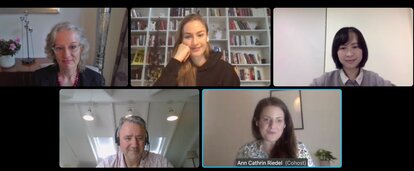
In this session, we invited panelists with expertise on how to make use of digital technology to foster democracy. The first panelists is Dr. Mei-chun Lee, who is a postdoc researcher of the Research Institute for the Humanities and Social Sciences (RIHSS) at the Ministry of Science and Technology, Taiwan. Dr. Lee has been researching how civic tech and digital activism can facilitate transparency of government and public participation. The second panelist is Ms. Adriana Groh, the Project Lead of the New Hanse. Ms Groh has been leading and initiating many projects regarding data commons, digital sovereignty, and enhancing people’s participation with the help of civic tech communities. Finally, Mr. Emil Schnackenberg, member of the Management Team for the Development Management Department in the City of Cape Town, was also invited to share his experience. By using the example of his works in city development management, he shed lights on how digital tools can help to sustain public participation during the Pandemic.
During the pandemic, authoritarian regimes leveled up their control and suppression of people’s freedom by the name of pandemic prevention. However, it was encouraging that all the panelists provided solid examples proving that with the help of technology and civic tech communities, public participation, privacy, freedom of speech, and transparency are not something we have to sacrifice for pandemic control. Instead, they are the key to inspire best practices tackling the Pandemic. Panelists brought up examples in German, Taiwan, and South Africa, showing that with the mindset of democracy, civil society and the government were able to re-imagine and re-design technology, making it a tool to sustain the service from the government, encourage public participation when face-to-face communication was impossible, and make information on pandemic freely shared online by all the citizens.
Especially, during the pandemic, civic tech communities helped to establish platforms online to encourage citizens to propose their ideas, reflect there needs, and contribute themselves on sharing information, and thus inspiring many successful digital tools and government-civil society collaborations for pandemic control. For example, Dr. Lee mentioned the online Mask Map in Taiwan showed that civic tech communities, the civil society, and the government can work together to control the pandemic. Ms Groh mentioned that the #WirVsVirus Hackathon 2020 in German also gathered 28,000 participants and 1,500 ideas tackling the pandemic, and people’s trust to the government was improved when the government was willing to be invited to have dialogue with the people.
For making technology helpful, Mr. Emil Schnackenberg reminded that since the development of technology will evolve very soon, leaders and works in government should keep a open mindset to learn it, and at the same time develop the capacity of technology and data management, since they will be the crucial to sustain the best quality of public service. However, panelists also emphasized that the way of participation should be inclusive and thus should not be limited to digital approaches. We should be open to find best way of participation, it can be hybrid, or anyways that proposed by the people. The point is not to leave anyone behind.
Don’t Fear the Techie Session
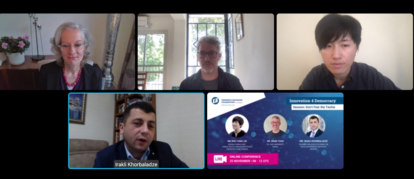
In this session, we invited the design consultant of Public Digital Innovation Space (PDIS), Ms. Shu-Yang Lin; co-director of IWiT and faculty member of the Department of Industrial Engineering at Tel-Aviv University, Dr. Eran Toch; and the founder and Executive Director of the Good Governance Institute, Mr. Irakli Khorbaladze, to discuss with us the application and importance of technology on democracy and politics.
Panelists all share their projects about how technology can really become a tool to foster democracy. For example, Ms Lin shared that PDIS, as one of Taiwan’s government apparatus, was created to help all the other government apparatuses to discover in what manners the digital tools could enhance people’s participation to policies and improve the efficiency of policy making process. By using Polis for the policy discussion with citizens, the process of opinion collection and integration can be more efficient than transitional ways, lowering the bar of participation. Moreover, by using all kinds of digital tools, Minister Audrey Tang and her team can publish their recording and transcription online in timely manner, fulfilling high degree of government transparency. Dr. Toch shared Meerkat Social Support App developed by his team. Based on collective efficacy, Meerkat is designed for the elderly that seek help from people in the network to solve technical problems, which is more inclined to autonomy based on the collective, rather than the individual. Similar to Lin, Toch also believes that marginalized people such as the elders and the poor should be taken into account in the process of digitization. Mr. Irakli Khorbaladze in Georgia has also been facilitating the making of E-Voting system and E-Georgia platform, enhancing transparency and participation through the use of technology.
From their experience, we learned that the point of how we perceive technology is not simply telling people its good or bad, but discover what the elements and preconditions can make technology become a helping hand to democracy and human rights. All the panelists mentioned the ultimate goal of using digital tools are enhancing participation, transparency, and thereby enhancing trust to the government and each other. As a result, when using digital tools, it is important to make sure not one is excluded. Particularly, when anyone lacks of the capability or access to digital tools, the government is responsible for providing them support or find better and more inclusive ways of participation and proving support. Secondly, as Dr. Toch mentioned, when designing digital tools, protection of privacy, autonomy of the users, participation, users’ possession of balanced rights, and spaces for discourse should be indispensable elements.
Disinformation Session
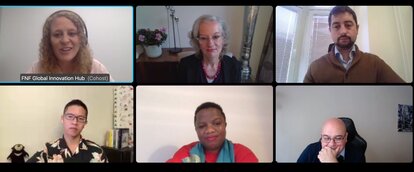
In this session, our panelists included: Mr. Chihhao Yu, Co-director of IORG from Taiwan; Mr. Valeriu Pasha, Chairman of the WatchDog.MD community from Moldova; Prof. Emre Erdogan, Head of the Department of International Relations at Istanbul Bilgi University and scientific coordinator of TurkuazLab from Turkey; and Ms. Phumzile Van Damme, Anti-Misinformation and Digital Rights Specialist and a member of the Real Facebook Oversight Board from South Africa. They are invited to share with us their respective line of work fighting against disinformation in elections as well as in our daily lives.
In this session, panelists demonstrated inspiring actions against disinformation taken by the civil societies across the world and gave an idea on what aspects people could put efforts to tackle disinformation. Civic tech communities across the world also played an important role in these initiatives.
One of the sources of disinformation in global landscape is the information operations from authoritarian regimes. The IORG co-director Mr. Chihhao Yu demonstrated how Taiwan’s civil society combats that by scientific and participatory methods. As a member of civic tech community in Taiwan, he and his team developed a databases tracking propaganda and disinformation aiming for information operation, and then developed an analytical tool to analyze the information, and thereby cautioned the public authoritarian regimes’ models of manipulating public opinion. However, at the same time they also conducted nation-wide media literacy trainings. Since media literacy is the important strength to defend citizens against infodemic caused by any reason.
Following that, the importance of media literacy training is also emphasized by Prof. Emre Erdogan. Disinformation itself will not be the only factor making it spread. Domestic culture-political context and lacking of education on critical thinking amplify it. Thus, he shared interventions that he and the TurkuazLab team have been working on. The first one is targeting the individuals. They develop curricular, games and organize local workshops, with the aim of mediating polarization. On top of that, they are also devoted to promoting freedom of the media and diversity of media landscape through online courses and seminars. To sum up, Erdogan and his team aim to raise people’s awareness about and increase resilience to information disorders with infodemic education.
Civil Society can also take an active role fighting against disinformation. Mr. Pasha shared the action of WatchDog. MD. WatchDog.MD is composed of a network of critical thinking supporters, including journalists, political analysts, civil activists, and visual artists. Their main task is to monitor all possible kinds of media: mainstream media like TV stations and talk shows, and social media like Facebook, which is used by a lot of Moldovans. In order to counter disinformation, they not only conduct fact-checking, but they also make explanatory videos to expose, explain, and blame disinformation. By mapping and denouncing disinformation, Mr. Pasha and his team aim to bring fairness to elections and create pressure to kleptocratic politicians who use dirty methods to win elections.